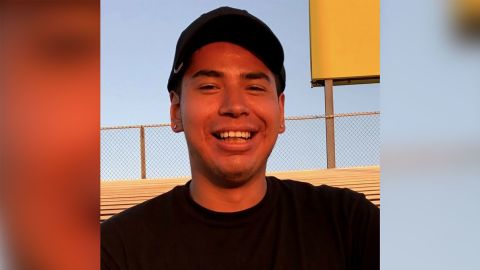[ad_1]
CNN
—
After community members spent days searching for Wanbli Vigil in knee-deep snow and brush in Denver, Colorado, authorities activated a statewide alert system on Tuesday to help find the missing 27-year-old Lakota man.
Vigil’s disappearance is the first case to activate Colorado’s new Missing Indigenous Person Alert (MIPA). The system was launched last week to address the state’s missing Indigenous people crisis. Colorado is among a handful of states that have created similar alert systems in the past year amid the nationwide crisis of unsolved Indigenous missing and murder cases.
“It’s needed, because we … as Indigenous people have been silenced too long, and abused too long and not taken seriously,” said Daisy Bluestar, a Southern Ute advocate and member of the Missing & Murdered Indigenous Relatives Taskforce of Colorado, a grassroots group that lobbied for the creation of the new alert system.

Vigil was last seen on December 29 around 2 p.m. as he left an apartment building in Denver and was reported as missing on New Year’s Day, his aunt, Jennifer Black Elk, told CNN. He was wearing blue jeans and a black jacket with white stripes, according to the alert issued by the Colorado Bureau of Investigation (CBI).
Black Elk said Vigil walked out of their apartment after sharing “personal issues” and left the door cracked. She initially thought Vigil went to pray because he was seen carrying a chanunpa, a ceremonial pipe, she said.
“He’s pretty funny. He’s pretty laid-back, easygoing and helpful and just a good person inside,” Black Elk said of her nephew.
The Colorado Bureau of Investigation launched the Missing Indigenous Person Alert system on December 30, 2022.
Its creation is the result of legislation passed last year to expand the investigation of cases of missing and murdered Indigenous people. Bluestar and other Indigenous advocates like her worked with state lawmakers to draft and pass Senate Bill 22-150 despite pushback from some lawmakers and agencies in the state. Gov. Jared Polis signed the bill into law last summer.
The legislation also required the state to create an office of liaison for missing and murdered Indigenous people.
The alert system is designed to be activated when an Indigenous person is reported missing to law enforcement. The legislation requires law enforcement agencies that receive a report of a missing Indigenous person to notify the CBI within eight hours of a report of a missing adult or within two hours of a report of a missing child, according to the Colorado Department of Public Safety.
If an Indigenous child is abducted, an Amber Alert will go out statewide, pinging residents’ phones, the CBI said. An alert under the new system will be issued if an Indigenous child goes missing in a non-abduction case.
Once an alert is issued, local and state law enforcement in Colorado are notified, as well as media outlets and other stakeholders who might distribute the alert information via email or text, CBI said. Unlike an Amber Alert, state investigators say the Missing Indigenous Person Alert will not go out to cell phones.
“The CBI understands the importance and effectiveness of the various alerts that are in place in Colorado, and we are pleased to have been asked to develop this newest alert in an effort to quickly locate missing Indigenous persons and return them safely to their loved ones,” CBI Director John Camper said in a statement.
As the search for Vigil continues, activists criticized how the new alert system was activated this week and said it could have been done in a more timely manner.
Denver Police said Vigil was reported missing on Sunday, but the Missing Indigenous Person Alert wasn’t issued until Tuesday.
“We’re losing valuable time in locating this young man or finding evidence as to where his whereabouts might be,” said Raven Payment, a Ojibwe and Kanienkehaka activist and member of the Missing & Murdered Indigenous Relatives Taskforce of Colorado who has joined the search for Vigil.
When asked about the time it took for the Missing Indigenous Person Alert to be issued, the Denver Police Department said its missing persons unit “opened a missing persons case and followed the notification procedure.”
When asked about the alert’s timing, the Colorado Bureau of Investigation said it issued the alert when it received information from the Denver Police Department. “The Denver Police Department is the lead on this case, as they took the report, and may have been performing investigative tasks leading up to the request for the alert,” the CBI said.
“For us to get this pushed through was an accomplishment, major accomplishment. But right now, you know, we’re at this point where it still doesn’t seem like it’s important enough or urgent enough,” said Bluestar, the other advocate.
Colorado is among three states that have implemented alert systems aimed to locate missing Indigenous people. Last year, Washington became the first state to create one and California launched a Feather Alert to assist in search efforts for an Indigenous person who has been reported missing under suspicious circumstances.
Nationally, there were 782 unresolved cases of missing Native American people as of August 2022, according to data from the National Missing and Unidentified Persons System.
Source link